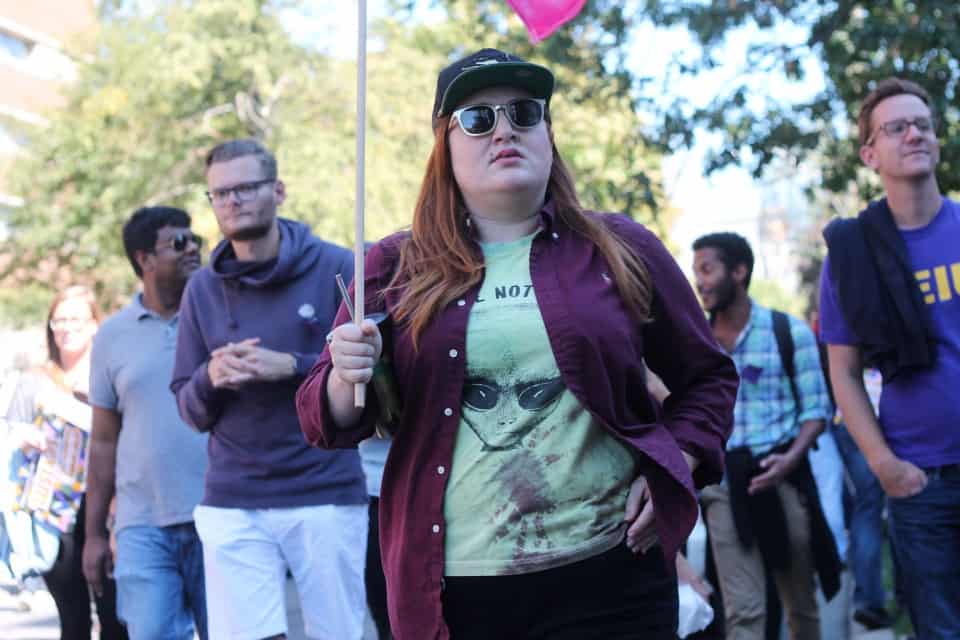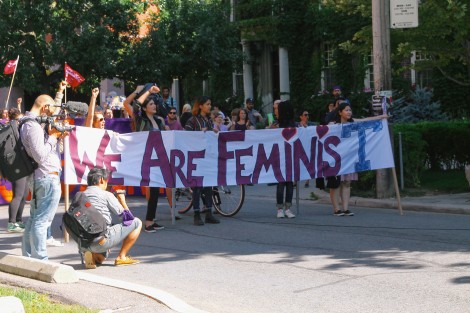On Monday, September 14, hundreds of University of Toronto students and community members marched in support of feminism. The demonstration was organized by the Canadian Union of Public Employees (CUPE) 3902, the union that represents education workers at U of T. It was in response to threats made online against women in the Sociology and Women and Gender Studies Departments who identify as feminists.
“We want everyone to know that U of T is a feminist community,” declared Pamela Arancibia, who co-organized the rally. She and fellow organizer Ellie Adekur-Carlson are both PhD students at U of T. “The idea to organize this rally came together really quickly,” explained Adekur-Carlson. “What we wanted to do is differentiate ourselves from the normal response to such an event by creating an inclusive environment where people feel like they can get real and share their stories and experiences about gendered and sexual violence, while also broadening the topic into the idea of misogyny,” she continued.
As a show of support for those victimized by gendered violence, attendees wore purple, a colour which has traditionally symbolized the movement against misogyny and sexual violence towards women.
The attendees marched around the campus, beginning outside the Sociology Department at Bloor and Spadina and ending at the Women and Gender Studies Department at New College. “The turn up at this event was absolutely amazing and so much more than we expected,” said Adekur-Carlson. “The collective energy with which this all came together was absolutely inspiring.”
Feminism speaks
The rally included a series of speeches from graduate students and student feminist activists, all of whom voiced their disapproval with the threats.
The rally began with the reading of an open letter previously published online by graduate students in the Sociology Department. “The letter is a collective effort by our graduate students, demonstrating our support for the message this rally stands for, i.e., a reminder that feminism is important,” said Anelyse, a graduate student who represented the group as a speaker at the event.
Many of the speakers voiced their disapproval of U of T’s response to the threats. Caitlin Janzen, a York University graduate student and a member of the feminist organization Silence is Violence, called the U of T response “public” and “superficial,” declaring that those targeted by the threats should refuse to be “good PR for the university.” Many others found the information shared by the administration inadequate.
Politicians Olivia Chow, Jennifer Hollett. and Kristyn Wong-Tam were also present at the rally. “U of T as an institution has led our city and our nation in feministic discourse and regardless of whether these ramblings were made by a couple of people or more, our response needs to be loud and it needs to be heard by the entire city,” concluded Wong-Tam in her speech.
Hollet agreed with Wong-Tam, voicing her hope that the present steps taken would ensure that there would be no future need to repeat such an event. Chow’s remarks served as the closing speech for the event, as she spoke of her own experiences with abuse.
Diversity of speakers
There were some who felt that the distribution of speakers at the rally lacked diversity, expressing concerns that there were no self-identified Indigenous, queer, or trans women who spoke, while a male feminist ally did speak. Sania Khan, vice-president, equity, with the University of Toronto Students’ Union, posted on the event Facebook page after the fact, commenting that “institutionalized white feminism drowned out the contributions of exactly those demographics and identities who are regularly not provided these kinds of platforms and spaces to vocalize their narratives.”
Although there was an open invitation for interested parties to come forward and help organize the event, Jades Swadron, a U of T student and organizer with the Trans Inclusivity Project, spoke to the difficulties that trans women face when in activist spaces.
“So many ideas surrounding gender, and the way it is constructed and expressed by all people, end up harming trans women, and trying to undo that overnight is an impossible task,” said Swadron. “A lot of respect and trans woman leadership is needed to make that change, and that is before we even look at factors preventing so many trans women from even participating without even giving them a choice, such as poverty and disability,” she said.
Swadron said that as a trans woman, they are in a perpetual state of potential assault, and that she cannot react with the same shock as cisgender women at the rally. “[When] I have actually been assaulted, and seen other trans women assaulted in public, I cannot even react with the same level of indignant disbelief that some white, cis women did at the rally. I have come to expect it,” they said. “So when I go to a rally talking about violence against women, and a man speaks while trans women are completely absent, it really upsets me.”
According to Swadron, at least one trans woman was contacted but was unable to speak at the event.
“[The] difficulty that exists for organizers to even get a single trans woman’s voice on a stage are significant… we are the women who face the highest amount of violence, our voices continue to not be the focus,” she said, adding the fact that a man spoke at the rally meant that cisgender feminists are more capable of elevating the voices of men than they are the voices of trans women.
“First, we want to thank folks for raising their concerns and fighting for a more inclusive feminist movement on campus,” said the event organizers in a collective statement. “As a women of colour-led coalition that includes queer and disabled people we recognize the long histories of marginalized voices being under-appreciated in this fight. While we did invite a very diverse group of presenters, including cis and trans women and men of colour and Indigenous women, to share their experiences on stage, due to the nature of the threats and the short time frame we were working with, the vast majority declined.”
The organizers said that they were looking forward to continuing to combat gender violence on campus and beyond, and that they would support the organizing done by Indigenous women, queer and trans women, and women with disabilities. They stated that their next steps are to mobilize the All Black Lives Matter rally for Take Back the Night on Saturday at 8 pm at Scadding Court. The event aims to centre the plurality of violence and anti-black racism and centers the experiences of black women, black queer and trans people along the gender spectrum, black people with disabilities, undocumented b lack people, and people in the criminal justice system.



